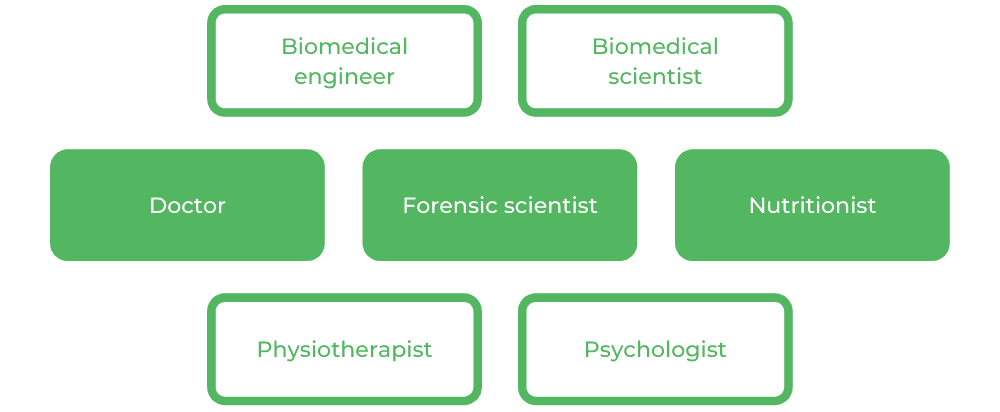In our previous article, you read what you’d encounter studying Medical Science at ANU. But, besides the core units, ATAR cut-offs, and scholarships, what do the students who take the course really think about it?
Continue reading as Pranav, a third-year Medical Science student from ANU, reflects on his study experience. You’ll learn about the pros, the cons and everything in-between related to the degree.
Keep scrolling to find out more!
Why should you study a Medical Science degree at ANU?
Top 3 Pros of a Medical Science Degree
Top 3 Cons of a Medical Science Degree
Mistakes You Shouldn’t Make
Things to Know Before Starting ANU Medical Science
What Makes this Degree Different
Motivations for Studying ANU Medical Science
Potential Career Paths
Why should you study a Medical Science degree at ANU?
“I wanted to study a degree that would provide me with a solid knowledge in science and would provide many options to choose from after graduating,” Pranav first says.
A Bachelor of Medical Science at ANU is great for building a strong foundation of the life sciences, but also finding where your passions lie. Being an undergraduate made up of mostly electives, you’ll get the flexibility to cover topics from nutrition, human diseases, physiology to genetics.
Taking a variety of these electives helps to figure out what postgraduate you’re interested in taking, or whether finding a direct career in medical research is the path for you.
Top 3 Pros of a Medical Science degree
#1: Avenue to study Medicine (and other postgraduate health degrees)
Most students prize over a Bachelor of Medical Science for its “potential to develop many professional connections and pathways“.
It’s often difficult to jump directly from high school into competitive degrees such as Medicine, Physiotherapy and Psychology. This undergraduate is great for those who still want a future in those careers, without stressing about that leap.
#2: Strong teaching style
Pranav tells us there is an excellent development of scientific knowledge through the engaging lecturers.
In this course, you’ll be guided by many lecturers who are excited to share their knowledge. Though it is often overlooked, the enthusiasm of the lecturers does affect how you take in the information during classes and further engage with the unit.
The help of your lecturers is definitely one of the strong points at ANU. Even with the busy schedules most lecturers and tutors have at ANU, any content-related questions are promptly answered.
ANU has a research-based teaching style, Pranav also reflects, wherein you’ll be challenged with critical thinking activities in all your classes.
#3: Freedom of electives
Pranav says that the great thing about this degree is the wide variety of subjects to choose from.
A Bachelor of Medical Science at ANU, after all, is often studied to open up a student’s options after graduation. The fact that the degree is a pathway to many postgraduate degrees is reflected in the wide range of electives.
Top 3 Cons of a Medical Science degree
#1: Tough competition
“Being in a health degree where many would like to enter a Masters or Doctoral degree, competition is high among students, and staff will be tough in marking,” Pranav says.
Nearly everyone in your cohort has similar ambitions of postgraduate study or would take the opportunity if given to them. The lecturers and tutors know this — be prepared to put your best foot forward in every class and make study groups to help motivate you.
A pro tip for this is joining the Chemistry Society, which helps out with academic-related resources and runs pre-exam tutorials organised by high-achieving students. Since there is also a lack of past papers provided in certain units, this is a way to secure the grades in those daunting final exams.
#2: Uncertain career path without postgraduate study
“There is a lack of a specific career after graduating, low chance of direct employment without completing Masters [or postgraduate study],” Pranav tells us.
Besides a career in medical research, there are not many other career options after graduation. In addition, postgraduate degrees typically require an extra 2-4 years of study, which will cost you financially and time-wise.
#3: Long contact hours
Lastly, to acquire the depth of knowledge for this degree, long contact hours are required.
The laboratory sessions can be most gruelling as they require the most concentration and time. However, it’s good to note while labs are scheduled to go for 3 hours, they rarely go for that long (unless something in the experimental procedure goes wrong!).
Any regrets?
Though a Bachelor of Medical Science at ANU can offer so many career choices with postgrad study, they are often unpredictable because of the high competition.
“I believe that I would have preferred a degree where I graduated into a direct career, such that I could begin working full-time without completing a Masters,” Pranav simply puts it.
What do you wish you had known before starting the degree?
In addition, if you’re prepared to take your chances, study your best in Biology and Chemistry in Years 11 and 12. This will really reduce your workload in the first year when becoming acquainted with scientific concepts in the degree.
What makes this degree different from the ones offered at other universities?
“ANU is very research based compared to other universities such as UNSW or USYD,” Pranav explains. “A student looking to pursue a career in research may be interested in completing Medical Science at ANU, as it provides excellent opportunities for Honours projects.”
So if research is something you see yourself pursuing as a career, then ANU will take care of you well!
What inspired you to choose this degree?
For Pranav, it was his passion for health as someone who wanted to study in the health field, but did not have many options to choose from. As for choosing ANU, it was a university close to his hometown.
However, for those moving to Canberra from another city, there’s no need to be nervous — the university experience and student support is one of the best in Australia.
Pranav lastly tells us, “I have made long lasting friendships from this degree that I am grateful for.”
What are the possible career paths?
Most Medical Science students pursue postgraduate study. With that in mind, students can enter careers in the following:
- Biomedical engineer
- Biomedical Scientist
- Doctor
- Forensic Scientist
- Nutritionist
- Physiotherapist
- Psychologist
For other roles you might consider with a Bachelor of Medical Science, head here! Or if you’re looking for Medical School find out the Top 5 Schools in Australia here!
Lynn Chen is a Content Writer at Art of Smart Education and is a Communication student at UTS with a major in Creative Writing. Lynn’s articles have been published in Vertigo, The Comma, and Shut Up and Go. In her spare time, she also writes poetry.





